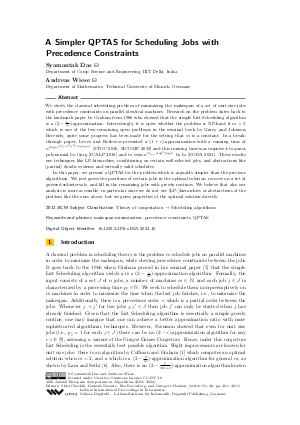A Simpler QPTAS for Scheduling Jobs with Precedence Constraints
Authors Syamantak Das, Andreas Wiese
-
Part of:
Volume:
30th Annual European Symposium on Algorithms (ESA 2022)
Part of: Series: Leibniz International Proceedings in Informatics (LIPIcs)
Part of: Conference: European Symposium on Algorithms (ESA) - License:
 Creative Commons Attribution 4.0 International license
Creative Commons Attribution 4.0 International license
- Publication Date: 2022-09-01
File

PDF
LIPIcs.ESA.2022.40.pdf
- Filesize: 0.58 MB
- 11 pages
Document Identifiers
Subject Classification
ACM Subject Classification
- Theory of computation → Scheduling algorithms
Keywords
- makespan minimization
- precedence constraints
- QPTAS
Metrics
- Access Statistics
-
Total Accesses (updated on a weekly basis)
0Document
0Metadata
Abstract
We study the classical scheduling problem of minimizing the makespan of a set of unit size jobs with precedence constraints on parallel identical machines. Research on the problem dates back to the landmark paper by Graham from 1966 who showed that the simple List Scheduling algorithm is a (2-1/m)-approximation. Interestingly, it is open whether the problem is NP-hard if m = 3 which is one of the few remaining open problems in the seminal book by Garey and Johnson. Recently, quite some progress has been made for the setting that m is a constant. In a break-through paper, Levey and Rothvoss presented a (1+ε)-approximation with a running time of n^{(log n)^{O((m²/ε²)log log n)}} [STOC 2016, SICOMP 2019] and this running time was improved to quasi-polynomial by Garg [ICALP 2018] and to even n^O_{m,ε}(log³log n) by Li [SODA 2021]. These results use techniques like LP-hierarchies, conditioning on certain well-selected jobs, and abstractions like (partial) dyadic systems and virtually valid schedules.
In this paper, we present a QPTAS for the problem which is arguably simpler than the previous algorithms. We just guess the positions of certain jobs in the optimal solution, recurse on a set of guessed subintervals, and fill in the remaining jobs with greedy routines. We believe that also our analysis is more accessible, in particular since we do not use (LP-)hierarchies or abstractions of the problem like the ones above, but we guess properties of the optimal solution directly.
Cite As Get BibTex
Syamantak Das and Andreas Wiese. A Simpler QPTAS for Scheduling Jobs with Precedence Constraints. In 30th Annual European Symposium on Algorithms (ESA 2022). Leibniz International Proceedings in Informatics (LIPIcs), Volume 244, pp. 40:1-40:11, Schloss Dagstuhl – Leibniz-Zentrum für Informatik (2022)
https://doi.org/10.4230/LIPIcs.ESA.2022.40
BibTex
@InProceedings{das_et_al:LIPIcs.ESA.2022.40,
author = {Das, Syamantak and Wiese, Andreas},
title = {{A Simpler QPTAS for Scheduling Jobs with Precedence Constraints}},
booktitle = {30th Annual European Symposium on Algorithms (ESA 2022)},
pages = {40:1--40:11},
series = {Leibniz International Proceedings in Informatics (LIPIcs)},
ISBN = {978-3-95977-247-1},
ISSN = {1868-8969},
year = {2022},
volume = {244},
editor = {Chechik, Shiri and Navarro, Gonzalo and Rotenberg, Eva and Herman, Grzegorz},
publisher = {Schloss Dagstuhl -- Leibniz-Zentrum f{\"u}r Informatik},
address = {Dagstuhl, Germany},
URL = {https://drops.dagstuhl.de/entities/document/10.4230/LIPIcs.ESA.2022.40},
URN = {urn:nbn:de:0030-drops-169782},
doi = {10.4230/LIPIcs.ESA.2022.40},
annote = {Keywords: makespan minimization, precedence constraints, QPTAS}
}
Author Details
References
-
Edward G Coffman and Ronald L Graham. Optimal scheduling for two-processor systems. Acta informatica, 1(3):200-213, 1972.

- Devdatta Gangal and Abhiram Ranade. Precedence constrained scheduling in (2-7/3p+1)optimal. Journal of Computer and System Sciences, 74(7):1139-1146, 2008. URL: https://doi.org/10.1016/j.jcss.2008.04.001.
-
Michael R Garey and David S Johnson. Computers and intractability, volume 174. freeman San Francisco, 1979.

- Shashwat Garg. Quasi-PTAS for Scheduling with Precedences using LP Hierarchies. In Ioannis Chatzigiannakis, Christos Kaklamanis, Dániel Marx, and Donald Sannella, editors, 45th International Colloquium on Automata, Languages, and Programming (ICALP 2018), volume 107 of Leibniz International Proceedings in Informatics (LIPIcs), pages 59:1-59:13, Dagstuhl, Germany, 2018. Schloss Dagstuhl-Leibniz-Zentrum fuer Informatik. URL: https://doi.org/10.4230/LIPIcs.ICALP.2018.59.
-
Ronald L Graham. Bounds for certain multiprocessing anomalies. Bell system technical journal, 45(9):1563-1581, 1966.

-
Shui Lam and Ravi Sethi. Worst case analysis of two scheduling algorithms. SIAM Journal on Computing, 6(3):518-536, 1977.

-
Elaine Levey and Thomas Rothvo. A (1+ epsilon)-approximation for makespan scheduling with precedence constraints using LP hierarchies. SIAM Journal on Computing, 50(3):STOC16-201, 2019.

-
Shi Li. Towards PTAS for precedence constrained scheduling via combinatorial algorithms. In Proceedings of the 2021 ACM-SIAM Symposium on Discrete Algorithms (SODA), pages 2991-3010. SIAM, 2021.

-
Ola Svensson. Hardness of precedence constrained scheduling on identical machines. SIAM Journal on Computing, 40(5):1258-1274, 2011.

